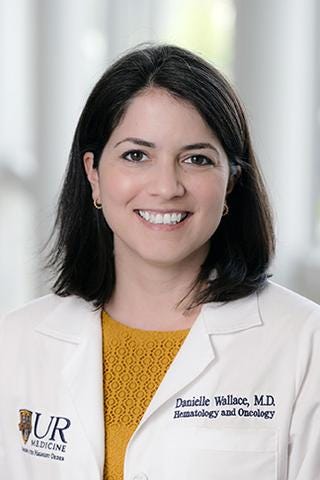You Funded It! Innovative Clinical Trial Aims to Improve Lymphoma Outcomes for Older Adults
Wilmot Cancer Institute researcher leads new study using ctDNA to guide additional treatment
Danielle Wallace, MD, has participated in the Wilmot Warrior Weekend for many years. She feels inspired when the community comes together to support research, and she enjoys participating alongside her patients and their families.
This year holds extra meaning for Wallace as she is the beneficiary of funds from the 2024 Wilmot Warrior Weekend. A portion of funds raised will support her clinical trial that attempts to improve outcomes for older patients with diffuse large B-cell lymphoma (DLBCL).
This is the first year that the Wilmot Warrior Weekend has funded a clinical trial. The 2023 event funded a team science pilot grant, and before that, funds raised from the Wilmot Warrior Walk funded various pilot research projects. Funds from the weekend also benefit the Judy DiMarzo Cancer Survivorship Program.
Because of their age, older adults diagnosed with DLBCL tend to receive lower chemotherapy doses, which can leave behind small amounts of cancer that are hard to detect, but still dangerous. The clinical trial at Wilmot Cancer Institute aims to tackle this problem with an innovative, personalized approach.
“Patients may appear to be in remission based on imaging, like PET scans, but still have microscopic disease lingering in the body,” says Wallace. “We now have the technology to detect traces of cancer DNA called circulating tumor DNA, or ctDNA—in the blood. If ctDNA is present after treatment, it could signal that the cancer hasn’t been fully eliminated.”
Wallace’s study proposes that patients who still have detectable ctDNA following initial treatment receive additional therapy using a drug called mosunetuzumab, a bispecific antibody that helps direct the immune system to attack remaining lymphoma cells. The goal is to clear even low levels of disease and ultimately improve the chances of a cure.
This approach is especially important for older patients. “Nearly one-third of patients with DLBCL are over age 75,” Wallace explains. “These individuals typically have lower cure rates than younger patients, and if they relapse, they often aren’t eligible for more aggressive treatments. That’s why it’s so important to improve outcomes the first time around.”
The trial is made possible through the Investigator-Initiated Trial (IIT) funding mechanism at Wilmot, which supports clinician-led research ideas outside traditional industry-sponsored or national cooperative trials. It’s one way Wilmot is continuing to bolster its cancer research enterprise after achieving designation from the National Cancer Institute. Looking forward, Wilmot hopes to strengthen this research-lab-to-clinical-trial pipeline, and growing the IIT program is among the first steps.
On the ground level, Wallace is hopeful that the results will lead to better long-term outcomes for older DLBCL patients and will inspire future trials that take advantage of precision medicine tools like ctDNA monitoring.
“These local trials are where bold new ideas can be tested,” says Wallace. “But clinical trials are expensive to run and support like the IIT program is critical. Without it, this study wouldn’t be possible.”





